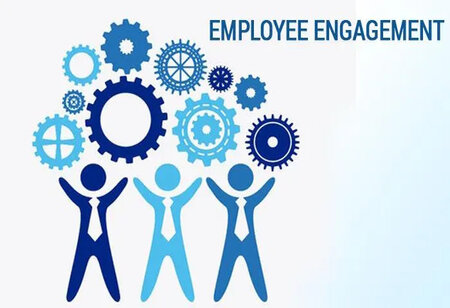By Tanuja NU, Content Writer
 Employee engagement is a multifaceted concept that plays a pivotal role in an organization's success. It encompasses the emotional commitment, motivation, and satisfaction of employees with their jobs and the organization. Engaged employees are more productive, innovative, and loyal, ultimately contributing to higher profitability and overall success. To achieve and maintain high levels of employee engagement, organizations must understand and address its essential components, often referred to as the 10 C's of employee engagement. Read below to know more about how these 10 C’s can transform your organization and elevate your workforce's dedication and performance.
Employee engagement is a multifaceted concept that plays a pivotal role in an organization's success. It encompasses the emotional commitment, motivation, and satisfaction of employees with their jobs and the organization. Engaged employees are more productive, innovative, and loyal, ultimately contributing to higher profitability and overall success. To achieve and maintain high levels of employee engagement, organizations must understand and address its essential components, often referred to as the 10 C's of employee engagement. Read below to know more about how these 10 C’s can transform your organization and elevate your workforce's dedication and performance.
1. Communication:
Effective communication is the cornerstone of any successful organization. Open and transparent communication channels facilitate the exchange of ideas, feedback, and information between employees and management. It allows employees to feel heard and valued, leading to increased engagement. Regular team meetings, feedback sessions, and clear communication of organizational goals help foster a culture of trust and collaboration.
2. Connection:
Building strong interpersonal relationships in the workplace is vital for employee engagement. When employees feel a sense of connection with their colleagues and supervisors, they are more likely to enjoy their work and stay motivated. Team-building activities, mentorship programs, and social events can help create a sense of belonging and camaraderie among employees.
3. Contribution:
Employees need to feel that their work makes a meaningful impact on the organization. Recognizing and appreciating their contributions boosts morale and engagement. Acknowledging and rewarding employees for their efforts, both big and small, reinforces their sense of purpose and motivation to excel in their roles.
4. Career Development:
Investing in employee growth and development is essential for long-term engagement. Providing opportunities for skill development, training, and career advancement not only improves employee performance but also demonstrates that the organization cares about their professional growth. Career development plans, mentoring, and ongoing learning opportunities can keep employees engaged and motivated to achieve their career goals.
5. Compensation:
While compensation alone cannot guarantee employee engagement, it remains a crucial factor. Fair and competitive compensation packages show that the organization values its employees and recognizes their contributions. Regular reviews and adjustments to compensation ensure that employees are fairly rewarded for their efforts, reducing the risk of dissatisfaction.
6. Clarity:
Clear expectations and well-defined roles are essential for employee engagement. When employees understand their responsibilities and how their work aligns with the organization's goals, they are more likely to be engaged. Managers should provide clear job descriptions, set performance expectations, and offer regular feedback to help employees stay on track.
7. Control:
Empowering employees to have some degree of control over their work fosters a sense of autonomy and ownership. When employees have input into decision-making processes and are encouraged to use their creativity and problem-solving skills, they become more engaged and motivated. Organizations can implement flexible work arrangements and involve employees in decision-making to promote a sense of control.
8. Consistency:
Consistency in policies, procedures, and leadership is crucial for employee engagement. When employees perceive that rules and expectations are applied consistently across the organization, they feel a sense of fairness and trust. Inconsistent practices can lead to confusion and erode engagement. Organizations should regularly review and update their policies to maintain fairness and relevance.
9. Celebration:
Recognizing and celebrating achievements, milestones, and successes is an integral part of employee engagement. Celebrations can be both formal, such as awards and recognition programs, and informal, like team lunches or shout-outs during meetings. Celebrating wins, no matter how small, boosts morale and motivates employees to continue their efforts.
10. Change Management:
Change is inevitable in today's business world, and how organizations manage change can significantly impact employee engagement. Clear communication, support, and training during times of change help employees adapt and stay engaged. Involving employees in the change process and addressing their concerns and feedback fosters a sense of ownership and minimizes resistance.
Understanding and implementing the 10 C's of employee engagement is essential for organizations looking to enhance productivity, reduce turnover, and create a positive workplace culture. By prioritizing communication, connection, contribution, career development, compensation, clarity, control, consistency, celebration, and change management, organizations can create an environment where employees are motivated, satisfied, and committed to their roles and the success of the organization. Employee engagement is not a one-time effort but an ongoing commitment that requires constant attention and investment to reap its many benefits.
We use cookies to ensure you get the best experience on our website. Read more...